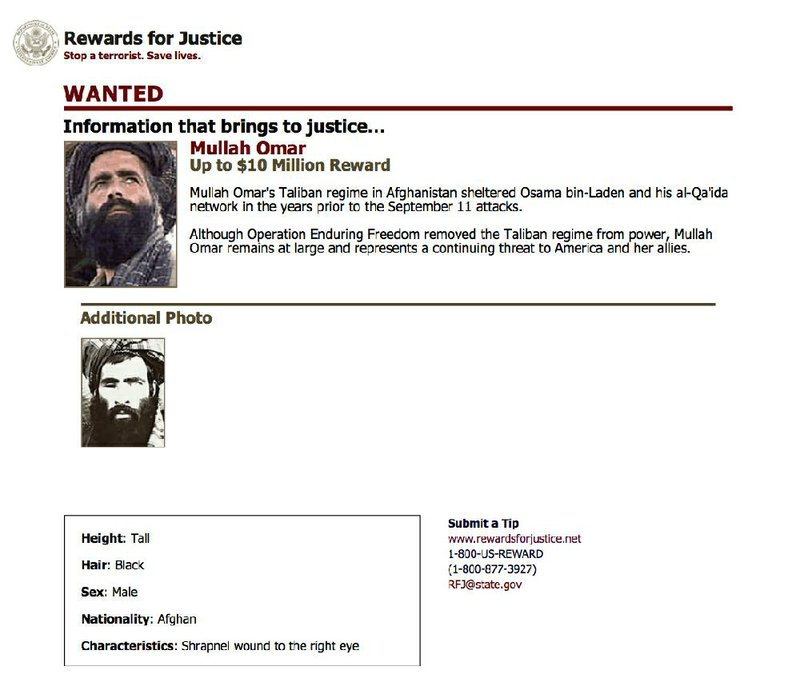KABUL, Afghanistan -- After months of speculation, Afghan officials announced Wednesday that they are now certain that the Taliban's reclusive leader, Mullah Mohammad Omar, died in Pakistan in 2013.
The announcement, first by a spokesman for the National Directorate of Security and followed by a statement from the Afghan president's office, came two days before negotiators claiming to represent the Taliban leadership are scheduled to sit down and talk peace with the Afghan government in Pakistan.
In recent months, the talks -- along with confusion and disagreement over Omar's status -- have proved divisive within the Taliban, leading some commanders to publicly question the group's leadership or even break away.
"There's no doubt," Abdul Haseeb Sediqi -- spokesman for the NDS, the Afghan spy agency -- said in a telephone interview late Wednesday. "We confirm he is dead. He died in April 2013, two years back, in Karachi."
A White House spokesman, Eric Schultz, said in a briefing that U.S. officials were aware of the reports and found them "credible." But he stopped short of confirming Omar's death, saying, "The intelligence agencies are right now reviewing these reports."
When asked why the United States was just now becoming aware of the Taliban leader's death after two years, Schultz said, "I'm just not going to be able to comment on the specifics."
A Taliban spokesman, Zabiullah Mujahid, told the Voice of America on Wednesday that the new death claims were false, calling it propaganda by the Afghan and Pakistani government. The Taliban have not produced proof of life for years, and the last audio recording from Omar came in 2006.
The Afghan spy agency had pronounced Omar dead in 2011, only to back off those claims later.
The reclusive militant, in his mid-50s, has not led the Taliban's day-to-day operations for years but retains a powerful spiritual hold over its senior-most commanders based in the Pakistani city of Quetta.
After fighting the Soviets in the 1980s, Omar began the Taliban movement with a small band of supporters and students in rural Kandahar province in the early 1990s. The Taliban took over Afghanistan and ruled from 1996 until the U.S. invasion in 2001.
Within the Taliban, Omar purged disloyal commanders or would-be defectors, and he adamantly refused to talk peace with the Afghan government while foreign military forces were in the country.
Now, the reports of his death cast uncertainty over the fate of current peace talks, which began July 7 with the first official face-to-face meeting between Afghan government and Taliban representatives at a resort in Murree, Pakistan, near Islamabad. Another meeting is set for Friday in Pakistan.
The insurgents' official political office, in Doha, Qatar, initially declared that the July meeting was invalid because Taliban officials in Qatar were not present and had not approved it.
At the same time, the Taliban's deputy leader, Mullah Akhtar Mohammad Mansour, said that he had authorized the talks, suggesting that he carried the imprimatur of Omar's leadership.
Reports about the Taliban leader's death intensified last week when a breakaway faction, Feday-e-Mahaz, posted a statement to Facebook saying Omar had died two years ago and was buried in Zabul province in southern Afghanistan.
Sediqi said Omar had died in a Karachi hospital but did not say which hospital or what he died of, nor did he reveal how the agency knew this. He said it had no information on where he was buried.
A different NDS official, speaking on the condition of anonymity to discuss intelligence, said that Omar had been "suffering from a disease" at the time of his death. The official added, "We do not know about the whereabouts of his graveyard or whether he received a ceremony."
The official said the Afghan intelligence service had learned of Omar's death a year and a half ago and that since then, "a lot of our international allies have confirmed the death." But he said he could not discuss the evidence that had led the Afghan government to conclude that Omar had died.
The official said that in the last years of his life, Omar had been relatively itinerant and was believed to have spent some time in Rawalpindi, home to the headquarters of the Pakistani military, among a host of other places.
"Because of the American drones, they were changing his place very often," the official said.
A senior Afghan security official, also speaking on condition of anonymity, insisted the intelligence on Omar's death is credible.
"This is not a single source of intelligence; there are a couple," the official said. "Different agencies and different countries were involved in that."
The official said that Omar's body had been "taken by unknown people to an unknown location. We don't believe he's in Afghanistan."
But the official also admitted that actual evidence was hard to come by and said he and others were not aware of any photographic evidence of Omar's body.
"Not many people have seen this guy alive, so I think not many people are going to see him dead," the official said.
Information for this article was contributed by Jawad Sukhanyar, Fazal Muzhary, Matthew Rosenberg and Gardiner Harris of The New York Times and by staff members of the Los Angeles Times.
A Section on 07/30/2015
